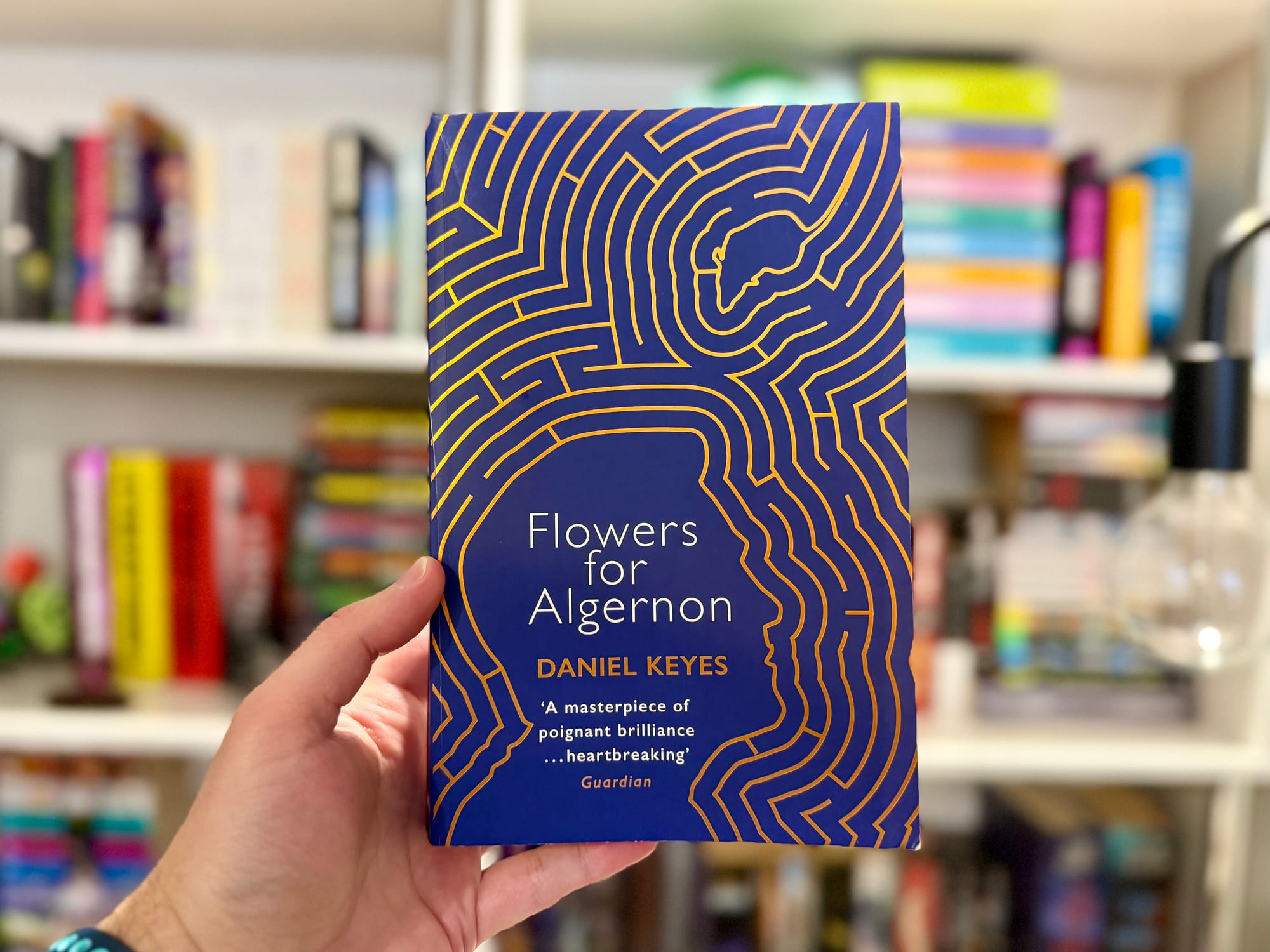Flowers for Algernon: Sometimes Books Are the Best Teachers

There’s a science fiction thought experiment that's been bouncing around in my head for many years: if you could use a cable to connect your brain directly to someone else’s brain, to temporarily experience everything exactly as they experienced it, would that change the way you viewed and interacted with that person? Would it change the way you viewed and interacted with the world? And would the impact of that shared experience be long-lasting or short-lived once the cable is disconnected?
The world has an empathy problem. I think it always has, but I also think it’s getting increasingly worse, or at the very least, becoming more apparent than it has ever been. I don’t have any research to back this up. It’s pure conjecture on my part, based on gut feelings, lots of reading, observations, and taking into account our current historical moment A.K.A the world is burning and no-one seems to care.
What I do have research to back me up on, however, is the claim that reading fiction increases empathy. It’s been a firmly held belief for decades, and more recently—in the last decade or so—there is evidence to show this is the case.
Now, it’s probably not a surprise to anyone that reading for enjoyment is on a steep decline according to the numbers. Over 60% of respondents to an Australian survey, or 13 million Australians, read as little as zero books—yes, that’s no books, none, zilch, nada—up to as many as three books in the last year. And while Australia might be a little better statistically speaking than some countries, we’re a lot worse than many others, too. Concerning statistics no matter how you look at them.
A question that I keep asking myself is this: Is the lack of fiction reading contributing to lower empathy? Are we becoming less empathic as a society because we don’t read for enjoyment as much as we used to?
It’s a scary thought.
I recently read, for the first time, Flowers for Algernon by Daniel Keyes. I know, I’m a bit of a late-comer to this wonderful book. And it truly is wonderful. It’s a science fiction novel first published in 1966, based on a short story Daniel Keyes wrote in the late 50s. That makes the story about 60 years old, but its central themes are timeless, as relevant today as they were in the 1960s. It’s not difficult to read, and fairly short so you could breeze through it in a day or two. It’s easy to see why it’s still often studied as a piece of literature.
If you’ve never read it, here’s an ultra brief spoiler-free synopsis:
Flowers for Algernon is the story of Charlie Gordon, a man with an intellectual disability who is given the opportunity to have his intelligence increased considerably through a medical procedure. We follow Charlie’s journey through a series of progress reports, written by Charlie himself, which uncovers his observations and insights about himself and the world and people around him as his intelligence changes.
I swear that gives away far less than the blurb on the back of the book…
Now, a thought struck me while reading, not even halfway through: “If everyone read this book, the world would be a much better place.” I believed it at the time, and I still believe it now long after having finished the book. Putting issues of equality, privilege, access and ability aside, if everyone on planet Earth was able to read this book, I truly believe the world would be the better for it. That’s how important I think it is.
Why? Because it teaches us what it’s like to be different from everyone else, using a metric that almost everyone can understand: intelligence.
Feeling like an outsider is not a difficult concept for the majority of us to understand because most of us have felt that way at one time or another (whether it was real or perceived actually doesn’t matter). Similarly, almost everyone has felt a little bit stupid or a little bit smart at some point in their lives (emphasis on the word felt because actual measures of intelligence are also irrelevant here). We have an idea of what it must be like to be considered ‘intelligent’ or ‘unintelligent’ because it’s something relatable and quantifiable (and yes, quantifying intelligence is problematic, but IQ testing is something that is still done, for example, and we all know what it means even if we don’t agree with it or think it’s mostly bullshit).
As unfortunate as it is, large groups of the population express resistance to the idea of reading a book about a person or situation that is unfamiliar to them, or that they don’t or can’t relate to. For example, this might be a white European person reading a story about an African-American family, a cisgender heterosexual person reading the story of a gay transgender person, or those who have always been financially wealthy reading about what it was like to grow up poor. For many people, these experiences seem unknowable.
Now, I know—and likely you know if you’re reading this essay—that reading about the experiences of others who are different to ourselves is kind of the whole point of reading, just like connecting with people who are different to us is one of the ways in which we can live a ‘good life’, however you might define that. But these examples I’ve given above are specific, and, for many people, too far removed from their own experiences that finding a way to relate can be a challenge. What these people need is a stepping stone towards empathy. What they need is to be taught empathy in general, using an example almost everyone can relate to.
I believe that’s what Flowers for Algernon achieves. The book illustrates what it would look like and feel like to be considered stupid by everyone around you, then suddenly considered a genius. You would see your friends differently, and they’d see you differently, too. You would see people’s motivations differently. You would relate to people differently. Through Charlie’s progress reports, we get his first hand experiences with their varying amounts of joy and despair, clarity and frustration. It makes us feel. And through our feeling, we empathise.
So until we have the technology to hardwire one brain to another to experience the world exactly as someone else does, we’ll have to be content reading books like Flowers for Algernon to teach us those all-too important lessons of empathy. And even when that technology exists, I hope we still always have literature like this. It’s what makes reading so unique and important, to use words—literal markings on paper—to transport the reader into another mind or another world. How is that not absolutely amazing?
